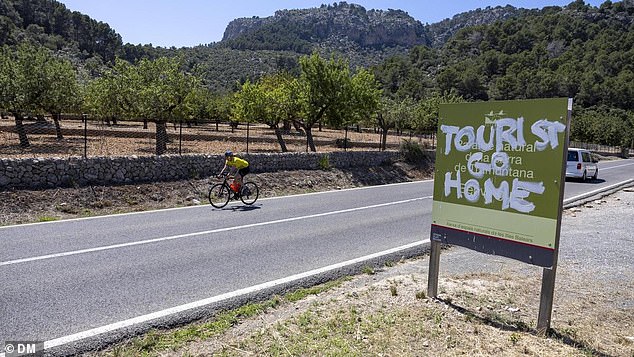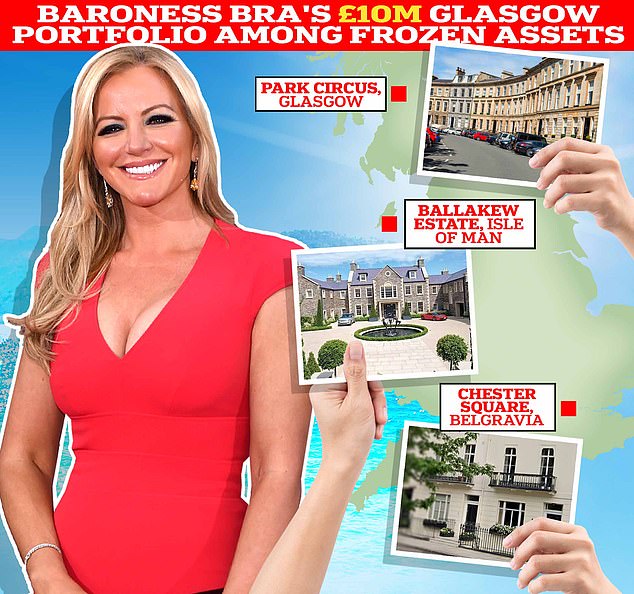More ‘tourists go home’ graffiti has appeared in Mallorca following a weekend of protests in Palma, as activists threaten to bring the island’s airport to a standstill.
Around 10,000 locals took to the streets of Palma, Mallorca’s capital, at the weekend, where they were heard chanting ‘tourists go home’, as they demanded curbs on mass tourism.
As reported by El Nacional, one campaign group, known as Menys Turisme, Mes Vida (Less Tourism, More Life), have said they could ‘collapse’ Palma airport, which according to The Times hosted 31.1 million passengers last year.
The tactic, which was first proposed at a ‘citizens’ assembly in the Mallorcan town, Sineu, also involves causing a traffic gridlock outside the airport.
‘It is a proposal that has no place within a society like the one we live in today, a measure that is currently classified as a crime,’ said Jaume Bauza, the tourism minister for the Balearic Islands.

Anti tourist graffiti was appeared in Mallorca following a weekend of protests in Palma.

Protesters shout at shocked holidaymakers enjoying dinner and drinks in Palma over the weekend.

An estimated 15,000 locals joined the protest that snaked through the capital Palma and headed for Weyler Square, where holidaymakers were out in force for dinner and drinks.

The colloquial expression ‘Guiri’ is used to describe the likes of British holidaymakers renowned for partying and heavy drinking, typically in a mildly offensive way.

Protesters carrying banners with anti-tourism slogans and banging drums gathered in the centre of the capital Palma as tourists headed out for their evening meals.

Protesters hold a banner reading ‘Mallorca is not for sale’ during a demonstration to protest against mass tourism and housing prices
The groups have also discussed the possibility of blocking the main port and other tourist hot spots, such as the Calo des Moro and Es Trenc beaches.
Bauza compared the tactics to Tsunami Democratic, a Catalan independence group that shut off El Prat airport in Barcelona in 2019.
He also warned that state security forces would be called in to tackle the protests if necessary, El Nacional reported.
On Wednesday, graffiti spelling out the words ‘Tourists Go Home’ emerged on access signs pointing to the Tramontana mountains in the island.
This comes after last month, the same anti-tourist slogan was scrawled over a wall underneath a real estate promotion billboard in Nou Llevant near Palma.
These are just some of the latest examples of anti-tourism sentiment, after foreign visitors enjoying their evening meals in central Palma were heckled by protesters holding signs on Saturday.
The banners campaigners carried included one with the offensive message: ‘Salvem Mallorca, guiris arruix’ which in Catalan Spanish means ‘Let’s save Majorca, foreigners out’.
It played on the colloquial Spanish expression Guiri which is used to portray northern European tourists like the British holidaymakers partying in Magaluf, usually in a mildly offensive way.
Another placard said in Catalan: ‘Where you look they’re all guiris.’
The Palma protest was organised by Banc del Temps, a group which hails from the inland Mallorcan town of Sencelles and has claimed 25,000 people joined in the demonstration, although government officials have put the figure at around 10,000.
Spokesman Javier Barbero said of the targeting of some holidaymakers: ‘We didn’t want to have a go at tourists and it shouldn’t have happened.’
However, he warned that ‘this is just the start of things.’
‘If measures aren’t taken we will continue taking to the streets until we see action.’
The protest, the largest of its kind since last month’s Canary Islands’ demonstration against mass tourism, was the second in 24 hours in the Balearic Islands.
Last Friday night around 1,000 protesters gathered in Ibiza to vent their anger over the effects of mass tourism.
Campaigners held up banners saying ‘We don’t want an island of cement’ and ‘Tourism, yes but not like this’ as they massed outside Ibiza Council’s HQ.
The organisers of the Ibiza protest, a group called Prou Eivissa, met with Ibiza’s president Vicent Mari before taking to the streets.

Anti-tourist graffiti appeared on walls and benches in and around Palm Mar in southern Tenerife last month.

Picture shows the words ‘Go Home’ on a hire car in Tenerife.
Their demands include a limit on the number of vehicles that can enter the island in summer and a ban on using taxpayers’ cash to promote Ibiza as a tourist destination.
After Catalonia, the Balearic Islands was the second most popular region of Spain for tourists last year, bringing in 14.4 million holidaymakers, according to the Spanish National Statistics Institute.
Tourism generates 45% of the island’s GDP, according to Exceltur.
Anti-tourism protests in Spain are not exclusive to the Balearic Islands.
Last month, graffiti also emerged on walls and benches in and around Palm Mar in southern Tenerife, Canary Islands, reading ‘tourists go home’ and ‘my misery, your paradise’, after thousands took to the streets, calling for a temporary limit for tourist arrivals.
After local politicians paved the way for tourists to be charged to visit the island’s natural spaces from the start of next year, the words ‘Canarias tiene un limite’ – English for ‘The Canary Islands have a limit – subsequently appeared painted on the tarmac of one of the access roads to the Teide mountain.
Another message painted on the road said: ‘Moratoria turistica’ – ‘Tourist moratorium’ in English.’
The Canary Islands are Spain’s third most popular tourist destination.
Some foreign holidaymakers have shown their support for the issues raised by campaigners but others have accused them of biting the hand that feeds them.








